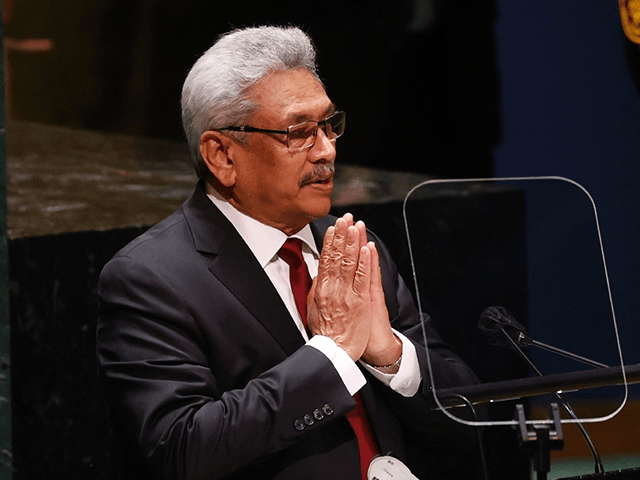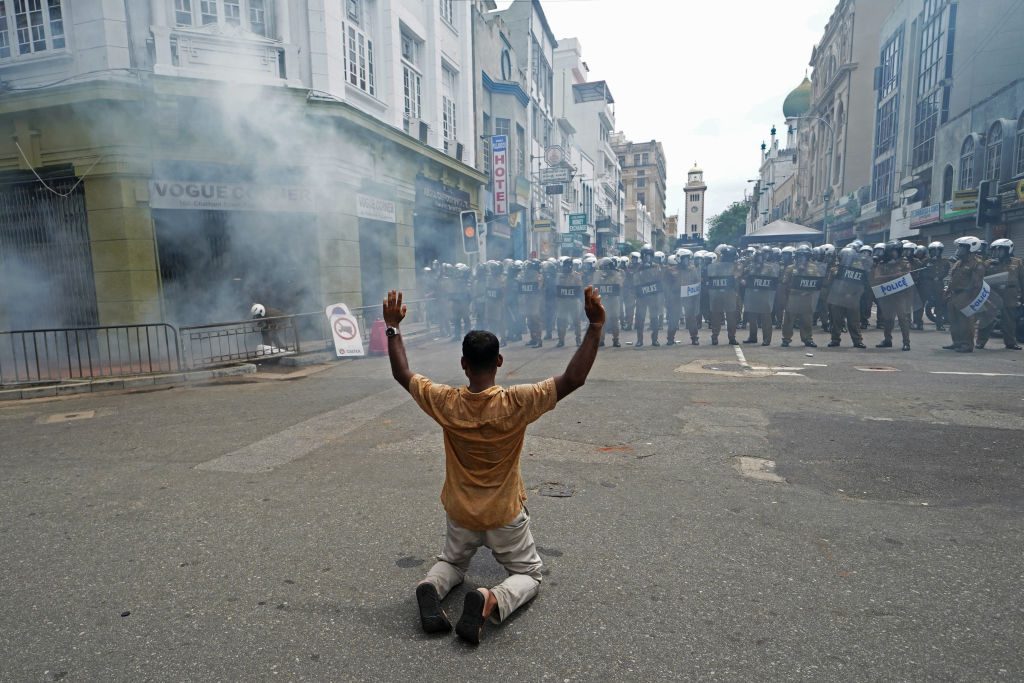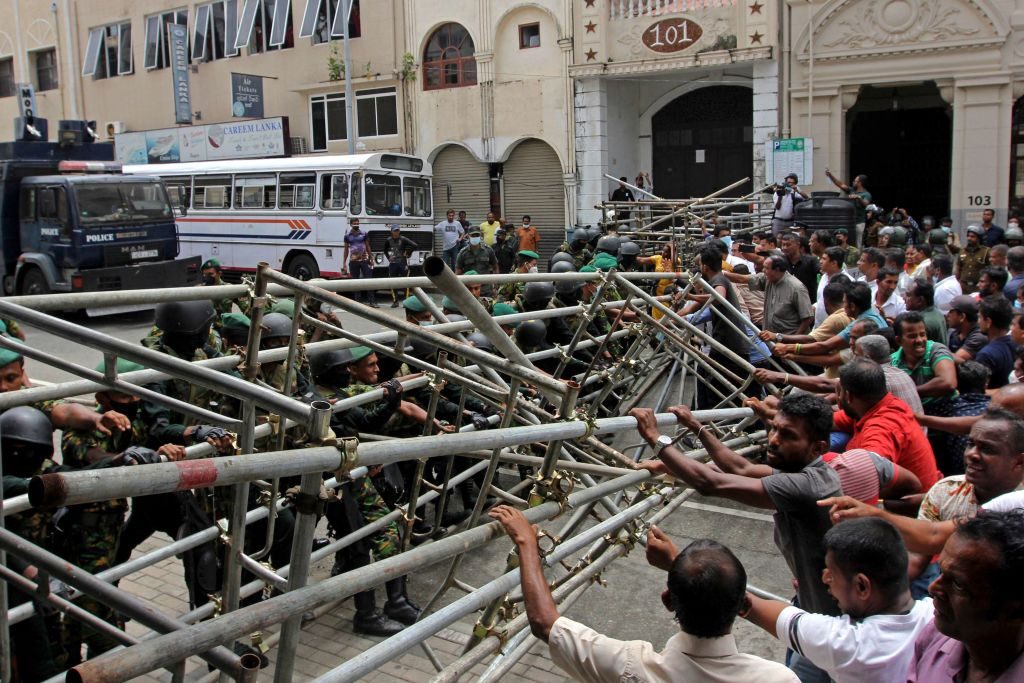President of Bankrupt Sri Lanka Calls Vladimir Putin Looking for Cheap Oil

Embattled socialist President Gotabaya Rajapaksa of Sri Lanka revealed on Wednesday he had called Russian strongman Vladimir Putin seeking help to purchase oil amid what the nation’s prime minister has called the “complete collapse” of Sri Lanka’s economy.
Sri Lanka’s overture to Russia – reportedly to discuss issuing the bankrupt country yet another credit line to be used for importing oil – follows months of calls from the administration of President Joe Biden and much of the Western world for nations to boycott Russia’s economy and, in particular, its lucrative oil, natural gas, and fertilizer industries.
The European Union announced that it would ban most Russian oil imports in May, a move that has had little effect given that Europe continues to import significant quantities of Russian natural gas and Russia has found eager buyers in China and India.
The Democratic Socialist Republic of Sri Lanka is facing the worst economic crisis in its history, the result of nearly two decades of rule under the Rajapaksa dynasty. The Rajapaksas – current President Gotabaya, his brother and ex-President Mahinda Rajapaksa, and a coterie of dozens of government ministers and other officials belonging to the family – used their power to take out massive predatory loans from China and make the country dependent on food imports with a “green” scheme outlawing chemical fertilizers.

A protest demanding the resignation of President Gotabaya Rajapaksa. The police launched tear gas and water cannons to disperse the protest. A large number of farmers participated in this event. July 06, 2022 Colombo, Sri Lanka (Photo by Thilina Kaluthotage/NurPhoto via Getty)
Sri Lanka’s government had depended on tourism revenue to keep afloat, which dried up after the Chinese coronavirus pandemic began in 2020 and left the country with no way of paying back its debts.
By subscribing, you agree to our terms of use & privacy policy. You will receive email marketing messages from Breitbart News Network to the email you provide. You may unsubscribe at any time.
Sri Lanka ran out of foreign currency reserves this year, giving it no way to pay for any imports.
Sri Lankan citizens currently face severe shortages of nearly every basic household good, including food products, fuel for vehicles and cooking, medicine, and school supplies. Citizens also face routine electricity cuts and deaths on long ration lines for gasoline and diesel have become a common occurrence.
“Had a very productive telecon with the [Russian] President, Vladimir Putin,” Gotabaya Rajapaksa announced in a message on Twitter Wednesday.
“While thanking him for all the support extended by his [government] to overcome the challenges of the past, I requested an offer of credit support to import fuel to [Sri Lanka] in defeating the current econ[omic] challenges.”
Rajapaksa said that he had also attempted to convince Putin to allow the Russian airline Aeroflot to return to Sri Lanka, highlighting the importance of tourism to the Sri Lankan economy.
The Russian news agency Tass, citing the Kremlin, reported following the call that the two leaders also discussed “energy, agriculture and transport.” It did not specify what kind of cooperation the two sought in the field of agriculture.
Russia is one of the world’s top exporters of chemical fertilizers – which Rajapaksa previously banned in pursuit of all-organic farming. Rajapaksa called the move a “mistake” in April, a month into the current crisis.
“I feel that the failure to provide chemical fertilizer to farmers was a mistake, we have taken steps to provide that again,” the president promised at the time.
Tass made explicit that Rajapaksa requested the conversation with Putin, not vice versa.

Farmers try to break a police barricade during an anti-government protest demanding the resignation of Sri Lanka’s President Gotabaya Rajapaksa over the country’s ongoing economic crisis in Colombo on July 6, 2022. (AFP via Getty Images)
Sri Lanka’s Daily Mirror newspaper reported on Wednesday that Sri Lanka has completely run out of oil fuels and has neither the money nor the resources to import any gasoline, diesel, or kerosene until at least July 22. Power and Energy Minister Kanchana Wijesekara claimed on Thursday, however, that Sri Lanka found a way to ship oil into the country on the week of July 13, “but they could not confirm the date.”
Shortly after Rajapaksa made the conversation with Putin public, multiple Sri Lankan news outlets reported the presence of representatives from an unnamed “Russian oil company” in the country.
Ada Derana, a Sri Lankan news site, observed that the representatives appeared to fly into the island nation from Bahrain, as no direct flights between Moscow and Sri Lanka are currently available. The reports only stated that the men were in the country to meet with government officials but provided no information on any potential agreements or conversations.
Sri Lankan Prime Minister Ranil Wickremesinghe, brought back to the role after nationwide protests forced Mahinda Rajapaksa out of the prime minister’s office in May, declared Sri Lanka’s economy a failure shortly after taking office. Mahinda Rajapaksa was the last Rajapaksa family member in his brother’s government to resign besides Gotabaya Rajapaksa; protesters burned down his home shortly after his resignation.
“We are now facing a far more serious situation beyond the mere shortages of fuel, gas, electricity and food. Our economy has completely collapsed,” Wickremesinghe told the Sri Lankan Parliament in June. “That is the most serious issue before us today.”
The state-run oil company, Ceylon Petroleum Corporation, was particularly challenging to rescue, he noted, because no country wanted to sell oil to Sri Lanka given its outrageous debts.
“Currently, the Ceylon Petroleum Corporation is $700 million in debt,” he explained. “As a result, no country or organization in the world is willing to provide fuel to us. They are even reluctant to provide fuel for cash.”
Wickremesinghe had described Russia as an option for oil sales previously.
“If we can get from any other sources, we will get from there. Otherwise, [we] may have to go to Russia again,” the prime minister told the Associated Press in June, admitting that “a lot of oil going around” in the country may be Russian, but “sometimes we may not know what oil we are buying.”

No comments:
Post a Comment